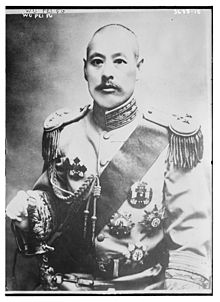Background
Wu Peifu was born in Shandong Province in eastern China.


Wu Peifu was born in Shandong Province in eastern China.
Wu Peifu passed the beginning level of civil service examinations before enrolling in the modern military academies established by the Qing government. He served under Cao Kun in a division of the Beiyang army when the Revolution of 1911 began. Both Cao and Wu provided critical assistance to Yuan Shikai during the Revolution and in the early years of the Republic ensuring Yuan’s control of the presidency. For their services Yuan rewarded them with repeated and generous promotions.
After Yuan's death in 1916, Wu emerged as a leading figure in the military faction, the Zhili clique. He participated in the war against Zhang Xun when Zhang attempted to restore the Qing monarchy in 1917, and then in a series of campaigns against Sun Yat-sen's Guangzhou regime. As the rivalry between the Zhili clique and the ruling Anhui clique intensified, Wu denounced the policy of forcible national reunification promoted by Premier Duan Qirui,the Anhui clique leader, and proposed instead peace negotiations between Beijing and Guangzhou. In 1920, Wu and Cao Kun collaborated with the Fengtian clique and ousted Duan from the Beijing government. For the next two years the two victorious factions jointly controlled the government in Beijing while competing with each other in expanding their respective domains into the Yangzi valley. This conflict eventually led to the first Zhili-Fengtian War in 1922, in which Cao and Wu’s Zhili forces triumphed.
As new national leaders, the Zhili clique initially adopted a conciliatory gesture toward other political forces in China. In an attempt to peacefully reunify the country, Wu and Cao restored the Constitution and parliament that had been abolished by Duan Qirui but had been defended by Sun Yat-sen's Guangzhou regime. The attempt was largely unsuccessful. Sun was soon ousted by his partner in Guangzhou but remained hostile toward Beijing. Moreover,the Fengtian clique was fermenting another challenge to the Zhili rule. In 1923, Wu helped elect Cao as the new president of the Republic. The election, pushed through with bribery and intimidation, further alienated other political forces from the Zhili clique. Wu himself assumed the position of commissioner of the Zhili-Henan-Shandong provinces, but in many ways he was the de facto leader of the Beijing government.
In foreign policy, the Zhili clique discontinued the pro-Japanese stance of the Anhui clique and solicited support from the Western powers. For a while Wu also maintained contacts with the Soviet Union and tolerated Communist labor unions in his territories. That tolerance, however, came to an end in 1923 when Wu suppressed the Communist-organized Beijing-Hankou Railway strike.
In 1924 Wu suffered a disastrous defeat in the second Zhili-Fengtian War after one of his commanders, Feng Yuxiang, defected to the Fengtian side. The Zhili rule in Beijing thus collapsed. After a year of recuperation and reorganization in Henan, Wu staged a political comeback in late 1925 and again dominated the middle and upper Yangzi regions. He then joined forces with his former rival, the Fengtian clique, in a war against Feng Yuxiang. While this conflict was still underway, the Guangzhou regime under Jiang Jieshi launched its Northern Expedition against Wu and other warlords. In late 1926 Wu was again defeated by Jiang's Nationalist forces and fled to Sichuan.
During the following decade of Nationalist rule, Wu retired from politics and lived quietly in Beiping (Beijing). After the Manchurian incident of 1931, he rejected repeated Japanese offers to lead a pro-Japanese separatist regime in North China. When the Sino-Japanese War broke out in 1937, however, Wu decided to stay behind the enemy lines. He died, following dental surgery, in occupied Beiping in 1939, it was rumored that he had been murdered by the Japanese.
